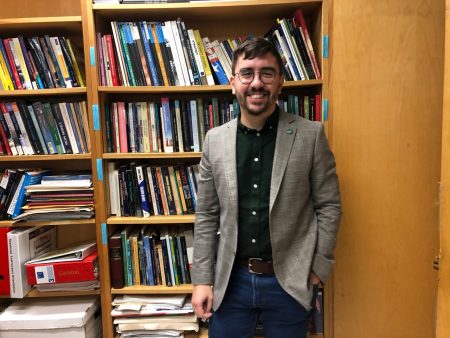Grad Research: Cold Hard Cash Turned Digital
In the last few years, we have seen the rise in digital money powered by blockchain technology.

James Patriquin, a PhD candidate in Political Science and Political Economy, is researching technological changes related to cryptocurrency and how these connect with the world global finance.
Patriquin explains that the purpose of digital money is to enable online transactions without relying on third-party financial institutions like banks.
“This is important for at least two reasons,” he explains. “The first is that it diminishes the ability of states to monitor financial transactions domestically and internationally, and second it threatens the state’s monopoly authority over the issuance and regulation of money and gives this capability to corporations as well. Digital currencies indicate to me the privatization and denationalization of money.”
A cryptocurrency functions like money but is powered by digital technology. It allows the public to essentially generate, accept and spend money that is not issued by any particular national government.
Bitcoin is a type of cryptocurrency, which aims to create a ‘trustless’ payment system where transactions are irreversible once processed on the BTC blockchain, which is essentially a cloud computer powered by processing power received from all over the world.
Patriquin believes that the future of money is cryptocurrency, for better or for worse. He describes it as being a highly fungible digital commodity that works within the established parameters of neoliberal global capitalism.
“Some see it as a revolutionary movement against U.S. hegemony in money and finance, but I am more inclined to see it as an extension of U.S. interests and authority over the global economy,” described the graduate student.
Patriquin explains that one’s understanding of cryptocurrencies is usually related to their proximity to reliable money. He uses the example of Canada. He explains that we do not see the need for digital money because our dollar is well managed, which results in cryptocurrency being considered a speculative investment. In other parts of the world, cryptocurrency is beginning to be seen more as a way for people to operate outside of the coercive and colonial boundaries of national money.
“Less and less are people using U.S. dollars outside of the territorial United States, and more are they using stateless alternatives to store and transfer value under oppressive conditions and high inflation.”
Patriquin is a recipient of the Rev. Dr. Bernard O’Connor Grant helping him build and operate a computer that generates, or in other words ‘mines’ cryptocurrency.
“Basically, I’m dedicating my computer’s resources to support various cryptocurrencies such as Ethereum and, in turn, I am paid out a small portion of newly minted cryptocurrency that enters circulation through me,” shared Patriquin. “This has been particularly enlightening. The other aspect of my research is conducting semi-structured and elite interviews with crypto regulators, entrepreneurs and influencers. My focus here is on the power of ideas, chiefly the idea of money and its augmentation by cryptocurrency, as well as the principles and beliefs which undergird the systems of value and valuation that lie at the heart of global capitalism.”
Dr. Randall Germain, a professor in the Department of Political Science, has been supervising Patriquin throughout his research.
“He taught me during my Masters in global finance and in international political economy, I’ve been his TA and his RA, and now I am teaching his course PSCI4805/5802 while he is away on sabbatical. Randall is an internationally renowned scholar, for good reason, and I am lucky to have learned so much from him.”
Patriquin’s goal is to publish his dissertation as a book to generate more interest and scholarship on the topic of digital money.
“I am not necessarily committed to an academic career, although I do find teaching and interacting with students to be a great source of inspiration.”
–The above story was written by Taia Goguen-Garner.